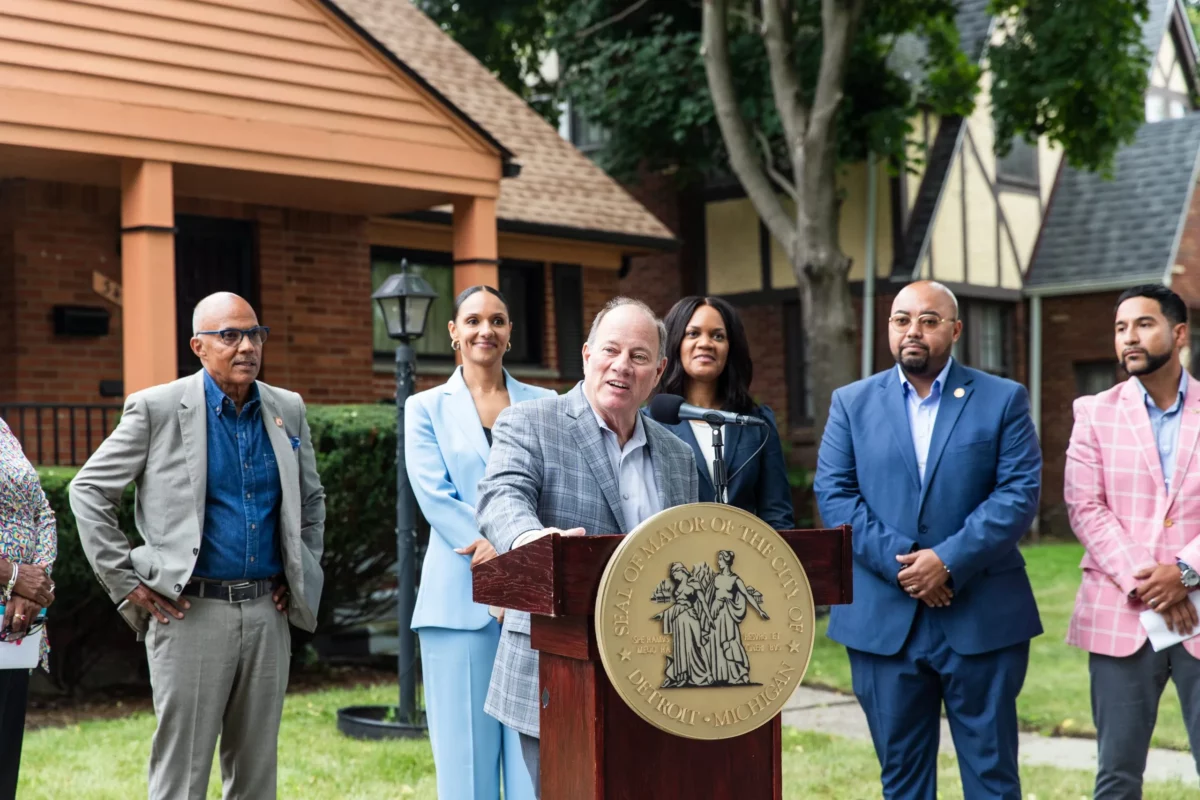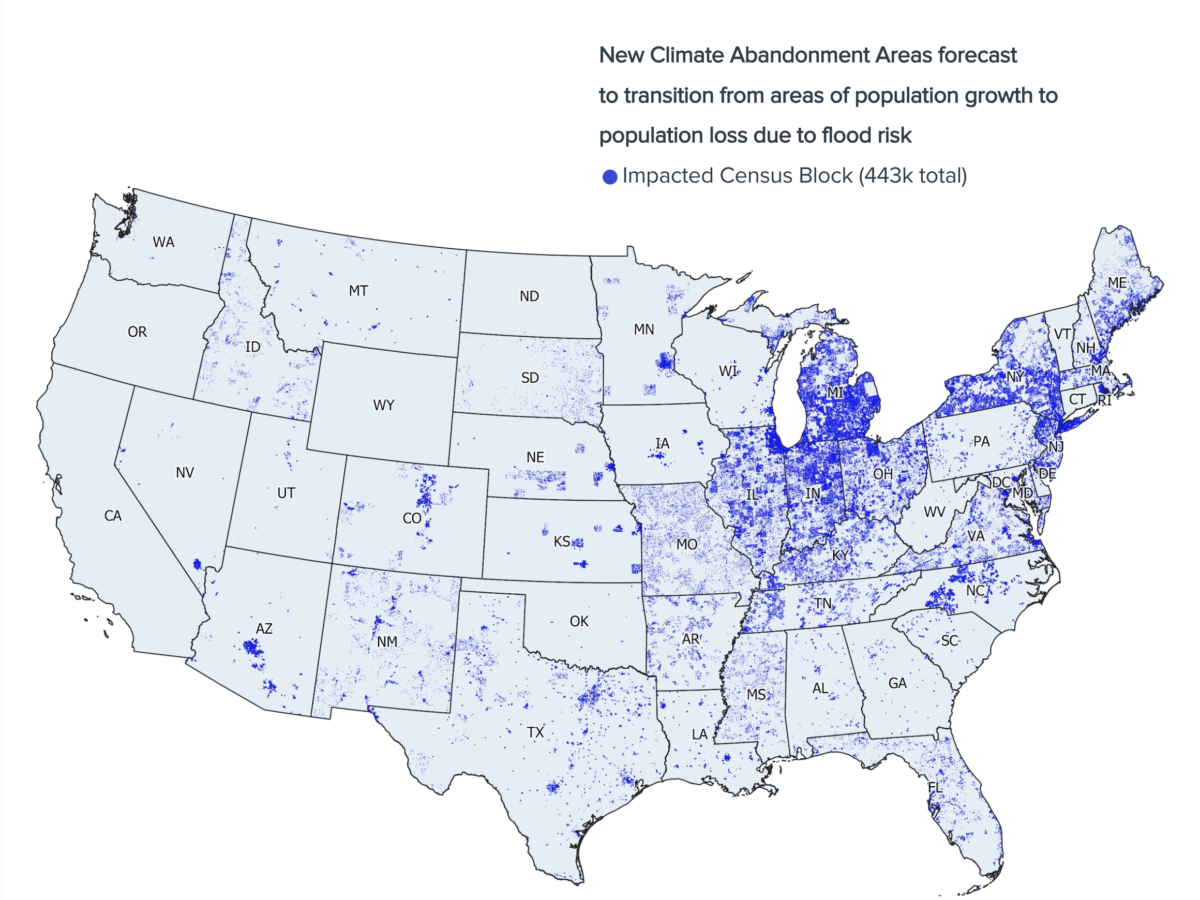Overview:
- Detroit is expanding its Private Sewer Repair Program to reach an additional 1,100 households, funded by $43 million from HUD's disaster recovery funds post-2021 flood.
- The city collaborates with five companies for repairs, focusing on private sewer lines.
- FEMA reports show an average of 10 inches of water in basements, with 79% of claims related to basement flooding.
The city of Detroit is expanding sewer repair aid to dozens of neighborhoods impacted by flooding in June 2021.
Detroit’s Private Sewer Repair Program is opening up to 75 more neighborhoods to serve an additional 1,100 eligible households across Detroit, the city said in a Monday news release.
The partnership between the city’s Housing and Revitalization Department and Detroit Water and Sewerage Department first launched in 2024 to serve 22 neighborhoods hardest hit by the 2021 flood.
So far, it has helped more than 400 families. But Detroit officials say the program has the capacity to reach an estimated 1,500 homes overall in nearly half of all neighborhoods.
The sewer repair initiative is funded with $43 million of the $95 million in disaster recovery funds Detroit received from the US Department of Housing and Urban Development as a result of the storm-related flooding three years ago. In late 2024, the city received $346 million more in similar funds. Detroit is currently at the community input phase in developing its action plan for using those funds.
Detroit Mayor Mike Duggan said more flooding is anticipated in the future, and the program will aid eligible Detroiters in protecting their homes.
“Repairing hundreds of damaged private sewer lines is just one of the many ways we are investing to make Detroit more resilient to flooding and the effects of climate change,” he said.
Detroit experienced a major storm on June 25-26, 2021, resulting in more than six inches of rain in 12 hours. The massive rain event exceeded the capacity of the public sewer system, flooded streets and freeways and impacted an estimated 30,000 households. A disaster declaration was triggered for four counties, including Wayne County. Weeks after the flooding, Duggan and Gov. Gretchen Whitmer secured a national disaster declaration from President Joe Biden, activating the Federal Emergency Management Agency (FEMA) and other government resources which resulted in the HUD allocation.

Under the city’s sewer repair program, eligible households can get repairs to portions of sewer lines that fall within their private property. If those lines are collapsed or damaged, they can lead to basement backups – even on dry days – exacerbated further during rain events, the city notes.
“When we go into a neighborhood for public sewer condition assessments, we are finding that nearly 30% of the private sewer lateral service lines are falling off from the sewer main, have serious cracks or other damage,” DWSD Director Gary Brown said. “These repairs are very costly to homeowners and increase the number of basement backups during rain events.”
The average height of water reported in FEMA claims was 10 inches, and 79% of claims made to FEMA were related to water in basements, according to the city.
The city is working with five contracted companies to complete the repairs. DWSD will oversee the work, which includes cleaning and inspecting lateral service lines with a camera scope, disconnecting downspouts, installing backwater valves and repairing or replacing the private lateral sewer.
To qualify, households must be at or below 80% of the Area Median Income (AMI), or $76,700 for a family of four. Applicants also must live in a single-family residential structure, demonstrate that the issues stemmed from the 2021 flooding and that there is no duplication of benefits. The properties also cannot be located within a floodplain.
Eligible neighborhoods are:
- District 1: Grandmont #1, Crary/St. Marys, Cadillac Community, Evergreen-Outer Drive, Hubbel-Lyndon
- District 2: Greenfield, Martin Park, Pilgrim Village, Dexter-Fenkell, Bethune Community
- District 3: Regent Park, Conant Gardens, Krainz Woods, Pulaski, Airport Sub, Hawthorne Park, Von Steuben, Grant, Mount Olivet, Cadillac Heights, Pershing, Franklin, Conner Creek, Sherwood
- District 4: Cornerstone Village, Morningside, Chandler Park, Fox Creek, Riverbend, West End, LaSalle College Park, East English Village, Yorkshire Woods, Denby, Mapleridge, East Canfield, Eden Gardens, Wade, Ravendale, Gratiot-Findlay, Outer Drive-Hayes, Moross Morang, Chandler Park-Chalmers, Fox Creek
- District 5: Arden Park, Islandview, Petosky-Otsego, Boston Edison, McDougall-Hunt, Pingree Park, East Village, NW Goldberg, Forest Park, Eastern Market, Gratiot Town/Kettering, Poletown East, Jamison, LaSalle Gardens, Wildemere Park, Medbury Park, Milwaukee Junction, Historic Atkinson, North End, Dexter-Linwood, Gratiot Woods, Gratiot Grand, Greektown
- District 6: Midwest, Chadsey‐Condon, Claytown, North Corktown, Michigan‐Martin, Corktown, Core City
- District 7: Aviation Sub, Garden View, Plymouth‐I96, Plymouth‐Hubbell, Paveway, We Care Community, Fiskhorn, Joy Schaefer, Warrendale, Warren Ave Community, Barton‐McFarland, Franklin Park, Oakman Blvd Community, Nardin Park, Russell Woods, Joy Community, Southfield Plymouth, Pride Area Community, Happy Homes, Northwest Community, Littlefield Community, Grand River-I-96, Davison-Schoolcraft, Chalfonte
Interested residents can see if they qualify and complete an application here. Residents can also call the Detroit Housing HelpLine at (866) 313-2520 to start an application.
The city is also offering in-person, one-on-one application support days:
- March 22: 10 a.m. – 4 p.m. at the Joseph Walker Williams Recreation Center, 8431 Rosa Parks Blvd., Detroit, MI 48206
- April 5: 10 a.m. – 4 p.m. at the Joseph Walker Williams Recreation Center, 8431 Rosa Parks Blvd., Detroit, MI 48206
DWSD has been cleaning more than 500 miles of the local sewer collection piping per year on a five-year rotation, including nearly 650 miles in 2024. Crews cleaned and inspected close to 7,000 street and alley catch basins last year to alleviate future flooding and the city said that work will continue in 2025.
In addition to 19 existing green stormwater infrastructure projects, DWSD is investing more than $100 million in local, regional, state and federal funding on flood mitigation including two massive detention basins in far west Detroit. DWSD is also working on a proposed 16-acre Brightmoor stormwater project and an east side flood resiliency study.
Currently, a half-billion dollars in sewer separation projects within Detroit are being performed by other government agencies in addition to the flood mitigation work being led by DWSD.
learn more
Flood risk study shows ‘climate abandonment’ in Michigan while some areas benefit
The study predicts most climate migration over the next 30 years will occur inside the state, with Wayne County losing population and Macomb and Oakland growing.
Residents share flood lessons as Great Lakes Water Authority tackles crisis
The Great Lakes Water Authority and the U.S. Army Corps of Engineers are collaborating on a multi-year study to explore flood management in Southeast Michigan, inviting public input to shape their findings.




